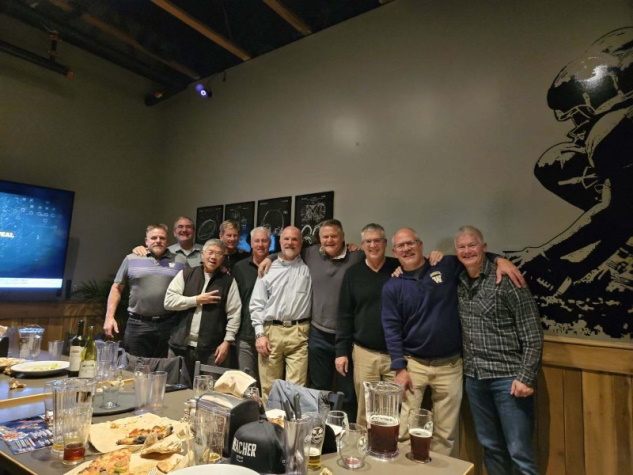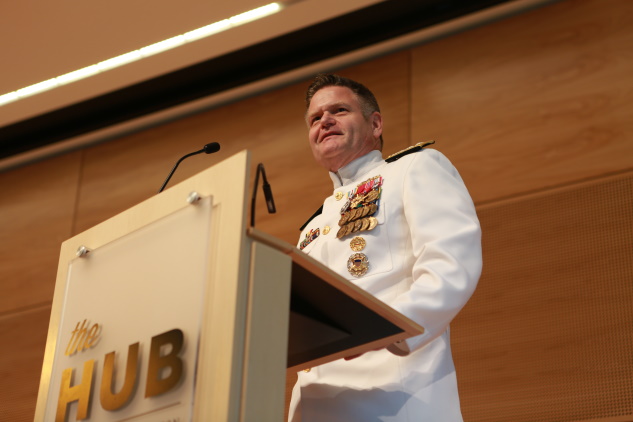Features

Over a career spanning three decades of military service in the U.S. Navy, Rear Admiral Brett Heimbigner (Washington) played a key role in the evolution of the country’s national defense. His leadership helped guide the strategies of the military from an emphasis on tactics to one more reliant on intelligence gathering and data analysis to defeat its adversaries.
Rear Adm. Heimbigner’s contributions to military and CIA missions throughout the globe will remain classified in the national security archives for years to come. But what the Admiral is allowed to talk about in his 30-year intelligence career would likely be a short – and highly redacted - story.
“There were deployments where even my wife, Genie, could not know where I was or when I was coming home,” Heimbigner said of his time spent in “hot spots” around the world, often in pursuit of violent extremists.
His mission, as well as the mission of the United States military and the Department of Defense, changed on Sept. 11, 2001, following the terrorist attacks on the World Trade Center, the Pentagon, and Shanksville, Pennsylvania.
“911 transformed my career and the lives of our [military] families, as it did for so many others,” said Heimbigner, who lost many friends and colleagues in the attack.
His accomplishments in advancing the Navy’s intelligence capabilities during his career earned him steady promotions and numerous awards for service. These accolades include the CIA’s Donovan Award, Director of Defense Intelligence Agency’s Award, Bronze Star, Combat Action Ribbon, Legion of Merit, Presidential Unit Citation (twice), multiple Iraq and Afghanistan campaign medals and citations, and commendations from NATO Allies.
“Intelligence is commonly viewed as the most important aspect of a counter-terrorism mission,” Heimbigner explains of his military focus. “[It supports] the tactical effort from finding terrorists in remote mountainous regions to running ISR (intelligence, surveillance and reconnaissance] operations globally.”
He retired from active duty in 2018 from the Joint Staff at the Pentagon and now resides in Monument, Colo., just outside of Colorado Springs. His home overlooks the campus of the Air Force Academy, and he jokingly says, “I can look out my back door and down on the Air Force,” a subtle dig at the friendly rivalry among the military branches.
Building the foundation of service and brotherhood

Heimbigner grew up in Sammamish, Wash., surrounded by the military presence of bases for the United States Air Force, Army, Coast Guard, and Navy. He often watched the military vessels along the waterways and was drawn to the opportunity to serve his country while deploying overseas.
Heimbigner carried that military interest with him to the University of Washington in 1983, where he was admitted into the Reserve Officers Training Corps (ROTC). The program provided him with a full college scholarship and an officer commission in the military upon graduation.
Heimbigner credits brother JR Roberts with bringing him into the Gamma Chi Chapter of Sigma Nu during his freshman year. Joining the Fraternity provided a welcome social respite from ROTC commitments and coursework and enduring connections that continued well beyond college.
“I so appreciate the sustained friendship with some of the brothers while I was often deployed at sea and in Iraq, Afghanistan, and Yemen,” Heimbigner said of the messages and letters he would routinely receive.
He also fondly recalls Brother Brant Ferrarini, a high school football teammate, Air Force Reserves pilot, and the son of a retired Navy captain instrumental in Heimbigner’s decision to join the Navy.
In 1996, Capt. Ferrarini was killed at the age of 32 during a routine navigation-training exercise off the coast of Portland, Ore.
“Lest we never forget Brant or all those who paid the ultimate sacrifice for our country,” said Heimbigner.
His years in Sigma Nu and interactions with brothers from all walks of life helped Heimbigner expand his outlook beyond his own personal experiences. He often credits his Sigma Nu Gamma Chi brothers for the professional and personal achievements he achieved throughout his military career.
“The chapter exposed me to a wider arrange of perspectives which prepared me well for operating with the U.S. Navy across the globe,” Heimbigner said.
Deployment across the globe
Heimbigner was initially drawn to the Marine Corps, but two knee surgeries in his youth sidelined the goal of infantry.
“I was given a choice of intelligence, cryptology, or supply support,” Heimbigner said of his career opportunities within the Navy. “Intelligence sounded like the most interesting option since you’re always in the middle of operations.” (He added, jokingly, “I also thought it might impress the young ladies, and I needed all the help I could get!”)
Following his graduation in 1987 and commission as an Ensign in the Navy, Heimbigner was sent to intelligence school for six months before being deployed to the Middle East.
“It was the start of many, many deployments overseas for the next 30 years,” he said, adding his oldest daughter was born in the United Kingdom; he didn’t meet his second daughter until she was four months old.
Most of his career was spent as an intelligence officer deploying globally, primarily in Europe and the Middle East. Heimbigner’s wide-ranging responsibilities included extensive combat intelligence special operations in Afghanistan, Iraq, and other Middle East and African terrorist concentrations.
He served three tours in Europe (London, Cambridge, and Brussels), including one as the Director of Intelligence and Warning for NATO Headquarters from 2014 to 2016, during the initial phase of Russian aggression against Ukraine.
Heimbigner gained significant national security and interagency experience from two U.S. Joint Chiefs of Staff and CIA headquarters detailed assignments. He regularly briefed the NATO North Atlantic Council (NAC) and the Secretary-General while chairing the Military Intelligence Committee comprising over 70 Allied intelligence and security services.
As he was promoted in rank and command responsibilities, Heimbigner transitioned – begrudgingly - from the field to headquarters assignments in Washington, D.C., and Europe. There, he established strategies and objectives from a global perspective, directing SEAL teams and field operations.
Rooting out evil across the globe
"Our war on terror…will not end until every terrorist group of global reach has been found, stopped, and defeated." President George W. Bush, Sept. 11, 2001.
Acts of terror and terrorists have been around since the start of civilization.

In the United States, the official War on Terror began on Sept. 11, 2001, when the nation endured three separate, coordinated attacks from foreign adversaries.
Heimbigner remembers every detail of that morning, as does nearly everyone old enough to understand what was unfolding before their eyes on national television.
For Heimbigner, it was personal.
He was at the Naval War College in Newport, Rhode Island, 150 miles up the Long Island Sound from New York City, when he got the first call that the Pentagon had been hit. It came from the wife of one of his lieutenants who was trying to locate her husband at the Pentagon.
She would soon receive news that her husband was among the 2,977 people who would die that day in the three attacks; struck down while attending a morning meeting with several other intelligence officers.
“The [events of 9-11] transformed my career and our lives as a family, as it did for so many others,” said Heimbigner, who was finishing his master's degree at the Navy War College.
“Most of the students in the class wanted to quit school and deploy immediately,” he recalls.
In the aftermath of the attacks, Heimbigner was selected for the SEAL (sea, air, and land) team as the director of intelligence, charged with leading deployments to Afghanistan and Iraq between 2004 and 2009.
“My job was to direct the Intelligence, Surveillance, and Reconnaissance (ISR) operation,” he said. “Simply put, my team’s job was to find the terrorists and interrogate them.”
Over the next several years, the team steadily improved its capacity to “neutralize” the terrorist threats, allowing the US military to turn the tide of the fight, particularly in Iraq.
“We [dismantled] al-Qaida and violent extremists through thousands of capture and kill operations, and my former unit eventually killed Usama Bin Laden in Pakistan after I detached,” said Heimbigner, who noted the movies “Lone Survivor” and “Captain Phillips” depicted operations in the missions he led.
He feels fortunate to have served among the nation’s finest military personnel and been guided by inspiring, capable leaders. The deployments were often “painful,” he said, with many casualties, but they were eased by the strong support of the American people.
“And receiving [U of Washington] Husky football updates from Bryan Roberts and notes from brothers, sometimes while in a bunker during rocket attacks, were always a welcome distraction,” Heimbigner said.
He is honored to be selected as a Visiting Scholar for the UW Jackson School of International Studies, sharing his experiences and perspectives within the confines of what can be made public.
Today, the retired admiral continues to support the nation’s defense as a director with Raytheon and hopes to inspire the next generation of military leaders and business leaders to continue the goal of a secure and resilient nation – and, ultimately, peace.
That goal is increasingly difficult to reach, with periods of sustained peace rarer, but Heimbigner knows the United States military will never stop trying.
“Ever since 9-11, there has been a steady pattern of combat operations or engagement, almost everywhere in the world,” he said. “At Raytheon, we simply can't build the missiles and the radars fast enough [for the US defense department] to keep up with what's going on.”
However, Heimbigner cautions those who may question the fortitude of the next generation of military members:
“I’ve witnessed first-hand the American warrior ethos come to life with young soldiers, sailors, airmen, and Marines in the hardest of times in Iraq, Afghanistan, and elsewhere. Often, they couldn’t even move beyond the operating bases without taking heavy fire and casualties while melting in heavy armor, but they were determined to take the fight to the enemy with a level of precision no other military on earth can match.
Pure U.S. military grit and determination overcame the most violent extremists… and continues to do so every day. Without the moral support of Americans and the incredible resources our business community generates to enable a military second to none…none of this would be possible.”